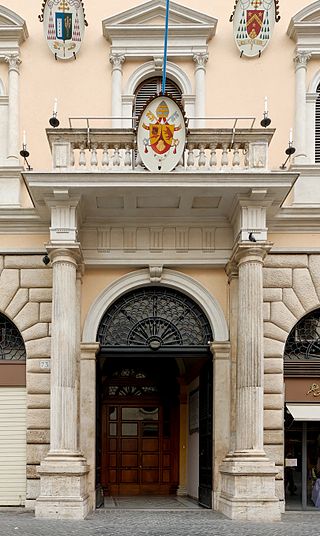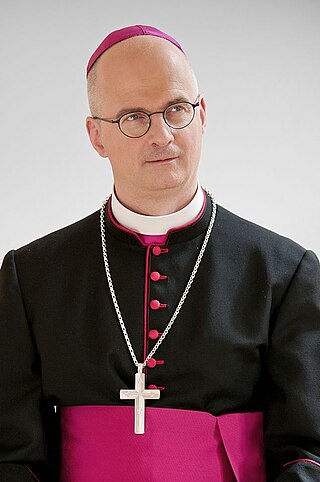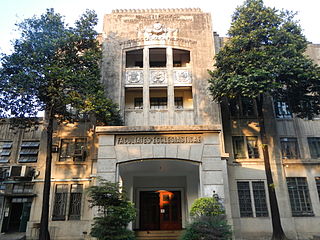List of pontifical universities
This section needs additional citations for verification .(July 2021) |
Argentina
- Pontifical Catholic University of Argentina, Buenos Aires
Austria
- International Theological Institute, Schloss Trumau
- Pontifical Athenaeum, Heiligenkreuz Abbey, Heiligenkreuz
Belgium
Bolivia
Brazil
- Pontifical Catholic University of Campinas, Campinas
- Pontifical Catholic University of Goiás, Goiânia
- Pontifical Catholic University of Minas Gerais, Belo Horizonte
- Pontifical Catholic University of São Paulo, São Paulo
- Pontifical Catholic University of Paraná, Curitiba
- Pontifical Catholic University of Rio de Janeiro, Rio de Janeiro [5]
- Pontifical Catholic University of Rio Grande do Sul, Porto Alegre
Canada
- Dominican University College, Ottawa
- Pontifical Institute of Mediaeval Studies, Toronto
- Regis College, Toronto
- Saint Paul University, Ottawa
Chile
- Pontifical Catholic University of Chile, Santiago
- Pontifical Catholic University of Valparaiso, Valparaíso
Colombia
- Pontifical Bolivarian University, Medellín
- Pontifical Xavierian University, Bogotá
Dominican Republic
- Pontificia Universidad Católica Madre y Maestra, Santo Domingo, Santiago de Los Caballeros, and Puerto Plata.
Ecuador
France
- Institut Catholique de Paris, Paris
- Institut Catholique de Toulouse, Toulouse
Germany
- Catholic University of Eichstätt-Ingolstadt, Eichstätt & Ingolstadt
- Munich University of Philosophy, Munich
Guatemala
- Universidad de San Carlos de Guatemala, Guatemala City
India
- Dharmaram Vidya Kshetram, Bangalore
- Jnana Deepa, Institute of Philosophy and Theology
- St. Peter's Pontifical Seminary, Bangalore
Ireland
- St Patrick's College, Maynooth, Maynooth; Pontifical University charter 1896 [6]
Can grant pontifical degrees.
- The Irish Dominican House of Studies (Studium) can grant pontifical degrees from the Angelicum, since 1971, originally from St. Mary's Priory but since 2000 from St. Saviour's Priory, Dublin.
Italy
(Pontifical Institutes and Faculties are listed in the Ecclesiastical Universities article, while here are the Pontifical Universities and Atheneum.)
- Pontifical Atheneum of St. Anselm (Anselmianum), Rome
- Pontifical Athenaeum Queen of the Apostles (Regina Apostolorum), Rome
- Pontifical Gregorian University (Gregoriana), Rome
- Pontifical Lateran University (Lateranensis), Rome
- Pontifical University of the Holy Cross (Santa Croce), Rome
- Pontifical University of St. Anthony (Antonianum), Rome
- Pontifical University of St. Thomas Aquinas (Angelicum), Rome
- Pontifical Urbaniana University (Urbaniana), Rome
- Salesian Pontifical University (Salesiana), Rome
Ivory Coast
Japan
- Sophia University (Jochi), Tokyo
Kenya
Korea
- Sogang University, Seoul
Lebanon
- Holy Spirit University of Kaslik, Kaslik
- Saint Joseph University, Beirut
Mexico
Montenegro
Panama
- Universidad Católica Santa María La Antigua, Panama City
Paraguay
Peru
Philippines
Poland
Portugal
- Catholic University of Portugal, Lisbon
Puerto Rico
Spain [7]
- Comillas Pontifical University, Madrid
- Pontifical University of Salamanca, Salamanca & Madrid
- University of Navarra, Pamplona
Ukraine
- Superior Institute of Religious Sciences of St. Thomas Aquinas, Kyiv; since 1992. An institution of higher education in Kyiv (Ukraine), conducted by the Dominican Friars of the Vicariate General of Ukraine and affiliated to the Pontifical University of St. Thomas Aquinas (Angelicum).
United Kingdom
- Mater Ecclesiae College, St Mary's University, Twickenham, London; since 2019. [8]
United States
- Catholic University of America, Washington, DC
Uruguay
Former pontifical universities
- Heidelberg University, Heidelberg, Germany, until the German Reformation
- Heythrop College, University of London; Bellarmine Institute, London, United Kingdom.
- Leipzig University, Leipzig, Germany, until the German Reformation
- Lund Studium Generale, Lund, Sweden, until the Danish Reformation [9]
- Royal and Pontifical University of Córdoba, Córdoba, Argentina, until 1856, during the presidency of Justo José de Urquiza
- Royal and Pontifical University of Mexico, Mexico City, Mexico, until the Mexican War of Independence
- Sapienza University of Rome, Rome, Italy, until the Proclamation of the Kingdom of Italy in 1870.
- Universidad Católica de Santo Tomás de Villanueva, Havana, Cuba, until 1961, after the Cuban Revolution
- Universidad de San Ignacio, Manila, Philippines, until 1768, after the Expulsion of the Jesuits
- Universidad Santo Tomás de Aquino, Santo Domingo, Dominican Republic (then in Haiti), until 1823, during the Unification of Hispaniola
- University of Aberdeen, Old Aberdeen, Scotland, until the Scottish Reformation
- University of Cambridge, Cambridge, England, until the English Reformation
- University of Cologne, Cologne, Germany, until the French Revolutionary Wars
- University of Copenhagen, Copenhagen, Denmark, until the Danish Reformation
- University of Erfurt, until the German Reformation
- University of Freiburg, until the suppression of the Society of Jesus
- University of Glasgow, Glasgow, Scotland, until the Scottish Reformation
- University of Greifswald, Greifswald, Germany, until the German Reformation
- University of Mainz, until the French Revolutionary Wars
- University of Oxford, Oxford, England, until the English Reformation
- University of Paris, Paris, France, until the French Revolution
- University of Rostock, Rostock, Germany, until the German Reformation
- University of Saint Andrews, Saint Andrews, Scotland, until the Scottish Reformation
- University of San Marcos, Lima, Peru, until the Peruvian War of Independence
- University of Tübingen, until the German Reformation
- University of Wittenberg, until the German Reformation
- University of Würzburg, Würzburg, Germany, until the Napoleonic Wars
- Uppsala University, Uppsala, Sweden, until the Swedish Reformation
- Milltown Institute of Theology and Philosophy, Dublin, Ireland. Pontifical Athenaeum (1968-2015)












